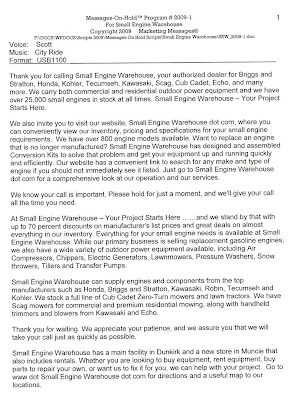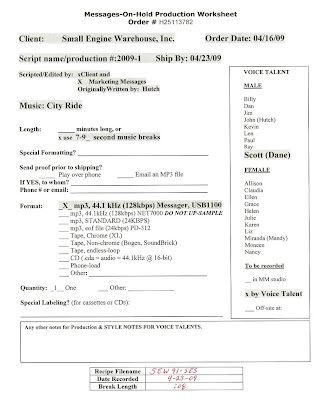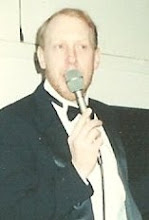
Much of what I do - recording voice-over artists, mixing Messages-On-Hold and putting together Music-On-Hold productions, or editing Auto-Attendant Messages, for example - is somewhat repetitious work. What I mean to say is that the general tasks are the same from job to job. And, if I constantly worked with the same client or talent or music, the routine could easily become mind-numbing.
However, one of the really good things about my work here at Marketing Messages is that we have a great variety of clients, a large roster of voice talents, and an interesting library of production music. The particulars of each job are rarely the same. They change often enough to keep my mind engaged and also give me some fulfillment in an artistic sense.
Artistic? Yes. When I put together a Messages-On-Hold production, for instance, clients often leave it up to me to choose suitable background music, matching it to the product being offered, the voice talent used, the pacing of the script, and so on. I usually decide how much time will be given to the music between speech segments, as well as the mixed level of the voice vis-a-vis the music. Does that fade-in sound right, or could it use some tweaking? Is that bit of instrumentation - a cymbal crash, perhaps - interfering with the speech? This is a longer production, and it requires three separate songs, so what three will mesh well together? All of these things are artistic choices, and I really dig it when I have a small puzzle to solve.
Of course, the voice talents are numerous and their sound varies greatly. We have some superb sets of pipes on our roster. All of our talents, aside from bringing their individual styles to the table, present differing levels of challenge during the recording and editing processes. As engineer during some of their recording sessions, I again get to make artistic choices, asking for a re-take to emphasize certain words or to get a pronunciation just right. And, during editing, I remove breaths, tighten spaces, boost or decrease volume levels, and perform many other small tasks that engage me creatively.
Another interesting thing is that I'm not always working with a talent whose first language is English. We do many recordings in foreign languages, and those present their own unique challenges for me.
(The foreign-language talents are interesting enough to be a post of their own. They will be, someday soon. Keep an eye out for it.)
Since our client's products vary greatly, there's often something interesting, fun, or quirky to latch onto within the actual script. Check out this listing of some of our clients:
A.A.R.P.
A. D. P.
AIG Insurance
Air Products Healthcare
Atlantic Bank of New York
Au Bon Pain Restaurants
Avaya Business Communications
Avery Denison
Bank of America
Bed, Bath & Beyond
The Boston Herald
Burt’s Bees
Children's Hospital Boston
Coldwell Banker
Congoleum Corporation
Corning Bioran
Cox Communications
Dairy Farmers of America
Decision One Mortgage
Del Monte Foods
Dick's Sporting Goods
Direct Marketing Association
DHL
Direct Tire
Electronic Data Systems (EDS)
E. M. C. Corp.
Ford Motor Company
Freightliner/DaimlerChrysler
Fuji Film
G.E. Global eXchange Services
Hilton International Hotels
The Hartford Insurance
H.S.B.C. Credit
Hong Kong Electric Co. Ltd.
John Hancock Insurance
John Deere
Kaiser Aluminum/Tennalum
Lexmark International
Liberty Mutual Insurance
Lucent Technologies
Marriott International
MBNA America
McKesson Pharmaceuticals
The NASDAQ
Parker Hannifin Corp.
Partners HealthCare Systems
Pepsi-Cola Bottling Group
Philips Lighting
Publix Supermarkets
Raytheon Corporation
Remington Arms Company
Rockwell Collins
RSA Security
Sears Auto Stores
Smithkline Beecham
Sony Electronics
Swissôtel
Texaco, Inc.
Timberland Footwear
U. S. Tennis Association
Toys-R-Us
Travelocity.com
Viacom
WebMD.com
Western Union
That's quite a varied clientele, wouldn't you say? And we have thousands of other companies for whom we do work (over 3,500 total.) I'd have to be brain-dead to not find at least something interesting from day-to-day.
And, on top of all that, the people who work with me here in the office are, without a doubt, the most versatile and entertaining group of humans with whom I've ever had the pleasure of sharing space. But, I told you that not too long ago.
OK, I've got to stop now. If I keep on writing like this, about how great my job is, my boss might get the idea that I'd be willing to do it for a lot less than he's currently paying me. That's an artistic choice I'd rather he not make.
See you soon.





